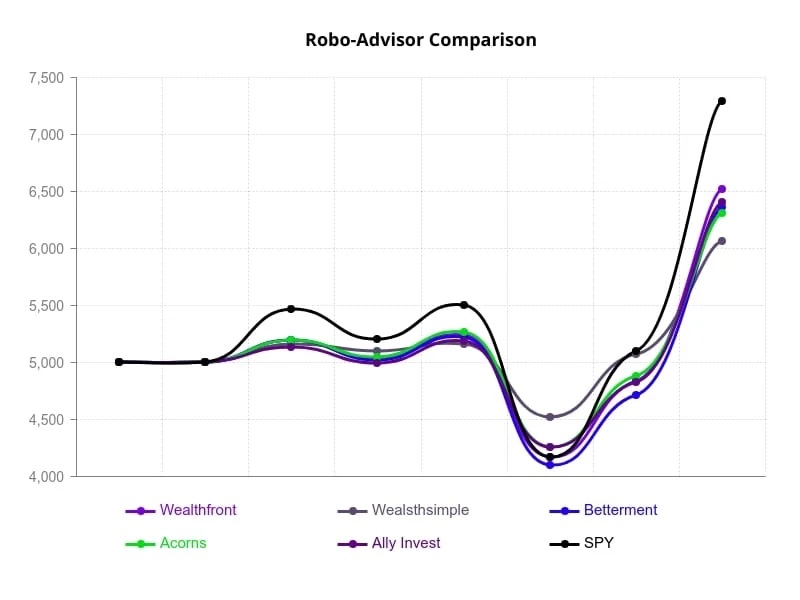In today’s rapidly evolving financial landscape, individuals are often faced with choices that can significantly impact their economic future. The advancement of technology has introduced a new breed of investment solutions that promise efficiency and accessibility. Many are now contemplating whether to engage with these sophisticated digital tools or to rely on the expertise of seasoned professionals.
A myriad of factors comes into play when determining the most suitable option for managing personal assets. From cost-effectiveness and ease of use to the level of personalized service and guidance required, individuals must carefully evaluate their preferences and goals. The decision may hinge on whether one seeks a hands-on approach or prefers a more automated, streamlined method tailored to individual needs.
As the financial landscape continues to evolve, understanding the unique strengths and weaknesses of each approach becomes increasingly essential. By examining both methods, individuals can gain clarity on how to navigate their financial journey and make informed choices that align with their aspirations.
Understanding Robo Advisors
Automated investment platforms have transformed the landscape of wealth management by leveraging technology to streamline financial planning and asset allocation. These digital services offer a user-friendly approach, enabling individuals to access tailored investment solutions with minimal human interaction.
Typically, these platforms utilize algorithms and data analysis to create personalized portfolios based on users’ financial goals, risk tolerance, and investment horizons. This efficiency allows for lower fees compared to traditional services, making it accessible to a broader audience, including those just starting their investment journeys.
Moreover, these services often provide continuous monitoring and rebalancing of portfolios, ensuring that investments remain aligned with users’ objectives over time. This automated approach can lead to more consistent performance and greater ease of use, especially for individuals who prefer a hands-off investment strategy.
Traditional Financial Advisors Explained
The landscape of personal finance is often navigated with the help of seasoned professionals who provide tailored guidance and strategies to clients. These experts exhibit a wealth of knowledge grounded in traditional methods, focusing on establishing lasting relationships and delivering personalized services. Their approach typically involves understanding individual goals, risk tolerance, and unique circumstances to create effective financial plans.
Personalized Strategies
One of the standout features of these professionals is their ability to design customized strategies to meet specific needs. They spend significant time engaging with clients, allowing for comprehensive assessments of financial objectives and aspirations. This face-to-face interaction fosters trust and rapport, essential for effectively addressing complex situations. By using this personalized approach, experts can adapt plans as life circumstances change, ensuring clients remain on track to achieve their desired outcomes.
Holistic Perspective
Additionally, these professionals take a holistic view of clients’ financial landscapes. They do not just focus on investments; instead, they encompass areas such as estate planning, tax strategies, and retirement funding. This multi-faceted approach helps individuals see the bigger picture and understand how various components of their financial lives intertwine. By considering all aspects, these experts provide insights that empower clients to make informed decisions while navigating the intricacies of their economic futures.
Key Differences Between Both Options
This section explores the primary distinctions between automated investment platforms and traditional human consultants. Each option offers unique features, suited for varying preferences and needs in investment management. Understanding these differences can guide individuals in selecting an approach that aligns with their financial objectives and personal style.
| Feature | Automated Investment Platforms | Human Consultants |
|---|---|---|
| Cost | Generally lower fees or commissions | Higher fees, often based on assets under management |
| Personalization | Standardized investment strategies | Customized plans based on individual circumstances |
| Accessibility | Available 24/7 through digital platforms | Limited availability, often requiring scheduled meetings |
| Support | Automated support with limited human interaction | Direct communication and guidance from an expert |
| Investment Strategy | Data-driven algorithms and models | Experience-based decisions and market insights |
Pros and Cons of Robo Advisors
The emergence of automated investing platforms has sparked significant interest among individuals seeking financial guidance. These digital solutions offer unique benefits and potential drawbacks that can influence one’s choice in managing their investment portfolio. Understanding these factors is crucial for anyone considering these modern alternatives.
Advantages
One of the primary benefits is the cost-effectiveness of these services. Typically, they charge lower fees compared to traditional options, making investment management accessible to a broader audience. Furthermore, their automated nature allows for quick decision-making and portfolio rebalancing, ensuring that investments align with market trends without requiring constant oversight.
Another significant advantage is the user-friendly interfaces provided by these platforms. Many individuals find the online tools and resources intuitive and straightforward, enhancing the overall experience of portfolio management. Additionally, the inclusion of diversified investment options enables users to spread their risk across various asset classes.
Disadvantages
Despite their merits, there are notable limitations to consider. A common concern is the lack of personal interaction. These platforms operate on algorithms, which may not account for unique individual circumstances or preferences. As a result, some investors may feel disconnected from their financial decision-making.
Moreover, the reliance on automated strategies may lead to a one-size-fits-all approach. This can be problematic for those with specific financial goals or complex situations that require tailored solutions. Users must also be cautious about potential over-automation, which might overlook critical adjustments in volatile markets.
Advantages of Hiring a Financial Expert
Engaging the services of a professional in finance can provide a multitude of benefits that enhance the management of personal or corporate wealth. These specialists bring expertise, strategic insight, and a personalized approach that can significantly influence financial outcomes.
- Personalized Strategy: They create tailored plans that align with individual goals, circumstances, and risk tolerance.
- Expertise and Knowledge: Possessing in-depth knowledge of market trends and financial products, they offer informed guidance.
- Behavioral Insights: They help clients manage emotional decisions that often accompany financial choices, encouraging rational decision-making.
- Time Savings: Delegating financial responsibilities allows clients to focus on other important aspects of their lives.
- Comprehensive Planning: Their holistic approach encompasses various aspects of finance, including investments, taxes, and retirement planning.
- Regulatory Awareness: Keeping updated on laws and regulations, they ensure compliance, minimizing potential risks.
Ultimately, partnering with a finance professional can lead to more informed decisions, reduced stress, and potentially greater wealth accumulation over time.
Making the Right Choice for You
Choosing between automated services and personalized consultation is a significant decision that many individuals face when managing their investments. Each approach offers unique benefits that cater to different financial needs, preferences, and risk tolerances. Understanding what each option entails can lead to more informed choices aligned with one’s personal goals.
Assessing Your Preferences
Before making a decision, it’s crucial to evaluate your comfort level with technology versus the desire for human interaction. If you appreciate data-driven recommendations and are at ease navigating digital platforms, an automated solution may serve you well. Conversely, if you value tailored guidance and emotional support through the ups and downs of investing, you might prefer working with a human expert.
Understanding Your Financial Goals
Your specific financial aspirations also play a pivotal role. If you aim for straightforward investment management with low fees, automated solutions often excel in this regard. However, if your plans involve more complex strategies, such as estate planning or tax optimization, seeking help from a skilled professional who can provide personalized insights may be more advantageous. Balancing cost, complexity, and your financial ambitions will help you determine the best fit for your circumstances.
Question and answer: Robo advisor vs financial advisor
What is the main difference between a robo-advisor and a traditional financial advisor?
The primary difference lies in the approach to investment management. Robo-advisors are automated platforms that use algorithms to manage investments based on your risk tolerance and goals. They typically require minimal human interaction and are often lower in cost. In contrast, traditional financial advisors provide personalized services, creating tailored financial plans that consider a client’s unique circumstances, and usually charge higher fees. This personalized service can include advice on a broader range of financial issues, such as estate planning and tax strategies.
Who would benefit more from a robo-advisor compared to a financial advisor?
Robo-advisors are generally suited for individuals who prefer a low-cost, hands-off investment approach, especially younger investors or those with less complex financial needs. They can be ideal for people who have straightforward investment goals and are comfortable with a digital platform. On the other hand, traditional financial advisors are better for individuals with high-net-worth portfolios, intricate financial situations, or those seeking extensive personalized advice on various financial matters, including retirement planning or tax optimization.
Can I trust robo-advisors with my investments, or should I stick to a human financial advisor?
Robo-advisors are generally considered safe, especially if they are registered with regulatory bodies and use established security measures to protect your data and funds. They typically follow a systematic investment approach, which can be effective for many investors. However, if you prefer human interaction, reassurance, and tailored advice for complex financial decisions, a traditional financial advisor may be the better choice for you. Ultimately, the trustworthiness depends on your comfort level with technology and specific financial needs.
What fees can I expect to pay when using a robo-advisor versus a financial advisor?
Robo-advisors tend to have lower fees, typically ranging from 0.25% to 0.5% of assets under management (AUM), with many offering no additional fees for account management. In contrast, traditional financial advisors often charge around 1% of AUM and may have additional fees for specific services. While the cost difference can be significant, it’s essential to consider the level of service provided; some investors find that the personalized advice and comprehensive planning offered by human advisors justify the higher fees.
Is it possible to combine both robo-advisory services and traditional financial advisory services?
Yes, it is entirely possible to use a hybrid approach, leveraging the strengths of both robo-advisors and traditional financial advisors. For instance, you might choose a robo-advisor for standard investment management and allocate more complex areas like tax planning or estate management to a traditional advisor. This approach can provide a well-rounded financial strategy, allowing you to benefit from cost-effective investment solutions while receiving expert guidance for your specific financial needs. Many platforms and financial services now offer this type of flexibility to cater to diverse client preferences.
How can a financial planner help in creating a comprehensive financial plan?
A financial planner can help by assessing your entire financial picture, including income, expenses, debts, and goals. They provide personalized strategies to achieve long-term objectives, offering tailored investment advice and helping with tax planning, retirement savings, and more.
What should you consider when making investment decisions without professional financial advice?
When making investment decisions without professional financial advice, it’s important to evaluate your risk tolerance, financial goals, and time horizon. Lack of comprehensive financial guidance can lead to mistakes, so thorough research and understanding of market conditions are crucial.
How do robo-advisors offer investment advice compared to traditional financial planners?
Robo-advisors offer investment advice through automated algorithms, providing low-cost, efficient portfolio management based on your risk profile and goals. While they lack the personalized touch of a financial planner, many robo-advisors offer diversified portfolios and require low minimum investment amounts.
What role do robo-advisors play in shaping your overall financial picture?
Robo-advisors play a key role in shaping your financial picture by automating investment decisions and portfolio management. They are ideal for those seeking cost-effective solutions, but for more comprehensive financial planning, a human financial planner may be necessary.
Why is it important to understand the minimum investment requirements before choosing a robo-advisor?
Understanding the minimum investment requirements is crucial because many robo-advisors have different thresholds that can affect your ability to start investing. Ensuring that the minimum investment aligns with your budget helps in making more informed financial decisions.
What’s the difference between robo-advisors and financial advisors in terms of services provided?
Robo-advisors and financial advisors differ in the scope of services they provide. While robo-advisors offer automated investment management based on algorithms, human financial advisors can provide personalized advice tailored to your entire financial life, including complex financial scenarios and holistic financial planning.
How do personal financial needs influence the choice between a robo-advisor and a human financial advisor?
Your personal financial needs play a crucial role in choosing between a robo-advisor and a human financial advisor. If you need basic investment management with low fees, robo-advisors are a popular choice. However, if you require comprehensive financial advising and guidance on aspects of your financial life, a human financial advisor might be better suited.
What are the benefits of working with a financial advisor compared to using a robo-advisor?
Working with a financial advisor offers benefits like personalized advice, complex financial scenario planning, and the ability to address all aspects of your financial life. Financial advisors typically offer more tailored services, whereas robo-advisors usually focus on portfolio management without delving into other personal financial areas.
How can many financial advisors provide value beyond what robo-advisors offer?
Many financial advisors provide value beyond robo-advisors by offering customized financial planning services that cover retirement, estate planning, tax strategies, and insurance needs. Unlike robo-advisors, which don’t offer detailed personal financial advice, financial advisors can help you navigate complicated financial situations and create a plan based on your financial goals.
Why might someone choose a certified financial planner over a robo-advisor platform?
Someone might choose a certified financial planner over a robo-advisor platform when they need comprehensive financial planning services, such as retirement and tax planning, which require a deep understanding of their financial picture. Certified financial planners are trained to provide advice that’s in your best interest, especially in complex financial scenarios where robo-advisors may fall short.
What aspects of your financial life can a traditional human financial advisor address that robo-advisors don’t?
A traditional human financial advisor can address aspects of your financial life that robo-advisors don’t, such as estate planning, personalized tax strategies, and customized retirement plans. Human financial advisors offer holistic financial planning that considers all areas of your financial situation.
How do many financial advisors typically approach complicated financial situations compared to robo-advisors?
Many financial advisors typically approach complicated financial situations with personalized strategies, taking into account your unique financial goals, life circumstances, and risk tolerance. In contrast, robo-advisors provide standardized solutions that may not be sufficient for more complex financial scenarios.
What should you consider when choosing between a robo-advisor and a human financial advisor?
When choosing between a robo-advisor and a human financial advisor, consider the complexity of your financial situation, the level of personal financial advice you need, and whether you value the cost-effectiveness and automation of robo-advisor platforms or the personalized attention from traditional human financial advisors.
In what scenarios do financial advisors also provide a more comprehensive approach than robo-advisors?
Financial advisors also provide a more comprehensive approach in scenarios that involve estate planning, tax strategies, or retirement planning. Unlike robo-advisors, which usually focus on automated portfolio management, human financial advisors offer in-depth advice on various financial aspects.
How can the best robo-advisors and human financial advisors work together to provide a balanced financial strategy?
The best robo-advisors and human financial advisors can work together by combining the strengths of both approaches. Robo-advisors provide cost-effective and efficient portfolio management, while human financial advisors offer comprehensive financial planning and personalized advice, creating a balanced strategy that addresses both immediate and long-term financial goals.








